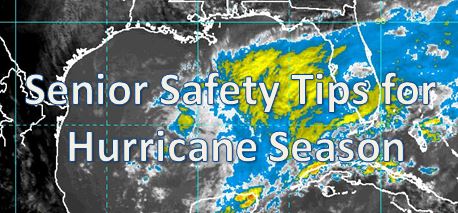
Here are some of the most common mistakes made in hurricane planning and senior safety tips for Florida elders to minimize risk and be more prepared:
- Being inadequately insured and logistically unprepared. It is vital to talk with your insurance agent to make sure coverage is adequate and updated, understand your deductible and the details of going about a claim. Organize important papers and have key numbers handy. Complete a thorough home inventory.
- Not taking a serious look at both the home and resident(s)’ ability to self-preserve in a storm. Now is the time to review overall home safety and consider hurricane reinforcement improvements, especially for older homes. It is also the time to put together emergency supply kits, both for the home and for possible evacuations. As far as the person(s) in the home, it is vital to assess the ability to care for one’s self through the storm and beyond. Be realistic about the dirty and dangerous truth of what it can take to survive in rough conditions.
- Underestimating the aftermath of storms. We all know that many residents, young and old, choose not to evacuate. Many who have lived in the area for some time feel they have always made it through safely in the past and can continue to do so, a common refrain during Hurricane Katrina. All of us must understand that even emergency personnel may not be available during dangerous weather (911 services are called off when winds reach a certain level), and during the aftermath of storms, basic infrastructure may take weeks or months to function normally. The individual should imagine functioning without electricity, limited/no services and support, and limited access to food or other supplies. The environment is not conducive to health and wellbeing, to say nothing of personal hygiene or comfort. Individuals in high-rise apartments or condos may be cut off by virtue of being unable to make it up and down many flights of stairs when elevators are not functioning. It is important to take the weeks after a storm in to account in planning supplies and other needs. Consider the aftermath carefully when deciding to weather out a storm at home.
- Counting on the public safety net as your first line of defense. Pinellas County offers special needs shelters and assistance evacuating for those who need it (individuals should contact the county now to register). These resources offer a safety net, but are not meant to be citizens’ first line of defense. Special needs shelters, for example, cannot offer acute medical care, have few cots, no hospital beds and may well be without electricity (air conditioning). Residents who evacuate there will need to bring their own bedding and supplies, medications and any special food items. It is a safe, but not comfortable, environment. Individuals should consider alternative arrangements such as evacuating to a relative or friend’s home in a safer area, or booking a respite stay at an assisted living or care facility.
- Neglecting crucial details. Get an emergency supply of medications. In 2006, the Legislature passed the Emergency Prescription Refill bill, Florida Statute 252.358 and 462.0275. This law requires all insurers and managed-care organizations to suspend refill-too-soon restrictions when a patient seeks a refill in a county under a hurricane warning, state of emergency or activated Emergency Operations Center. This law also allows patients outside of these areas to get an emergency 72- hour refill if the pharmacist is unable to readily obtain refill authorization from the doctor. Put together a list of all medications, diagnoses and key contacts to keep with you. Additionally, individuals should check with care providers to review their emergency plans (all Florida Agency for Healthcare Administration licensed providers must submit a plan to the state) and consider alternatives. People who rely on medical equipment or outside services should make provisions. If you use equipment that needs electricity, you can register with the power company for priority reconnection service and your medical equipment provider may be able to offer alternatives (battery backups, for example).
Aging Wisely is offering our Hurricane Preparedness Package for the affordable price of $199, to assist Tampa Bay area seniors with being better prepared for Florida hurricane season. Our planning process addresses critical safety issues in the home as well as evacuation alternatives for different scenarios.
Hurricane warnings generally come within 72 hours of a storm’s hit. At that point, it is too late to properly plan for someone who has mobility issues or special needs. If you have questions or would like to have help with hurricane planning or other senior safety issues, give us a call at 727-447-5845.
 Popular Downloads
Popular Downloads


 Get Our Newsletter!
Get Our Newsletter! Mission Statement
Mission Statement

